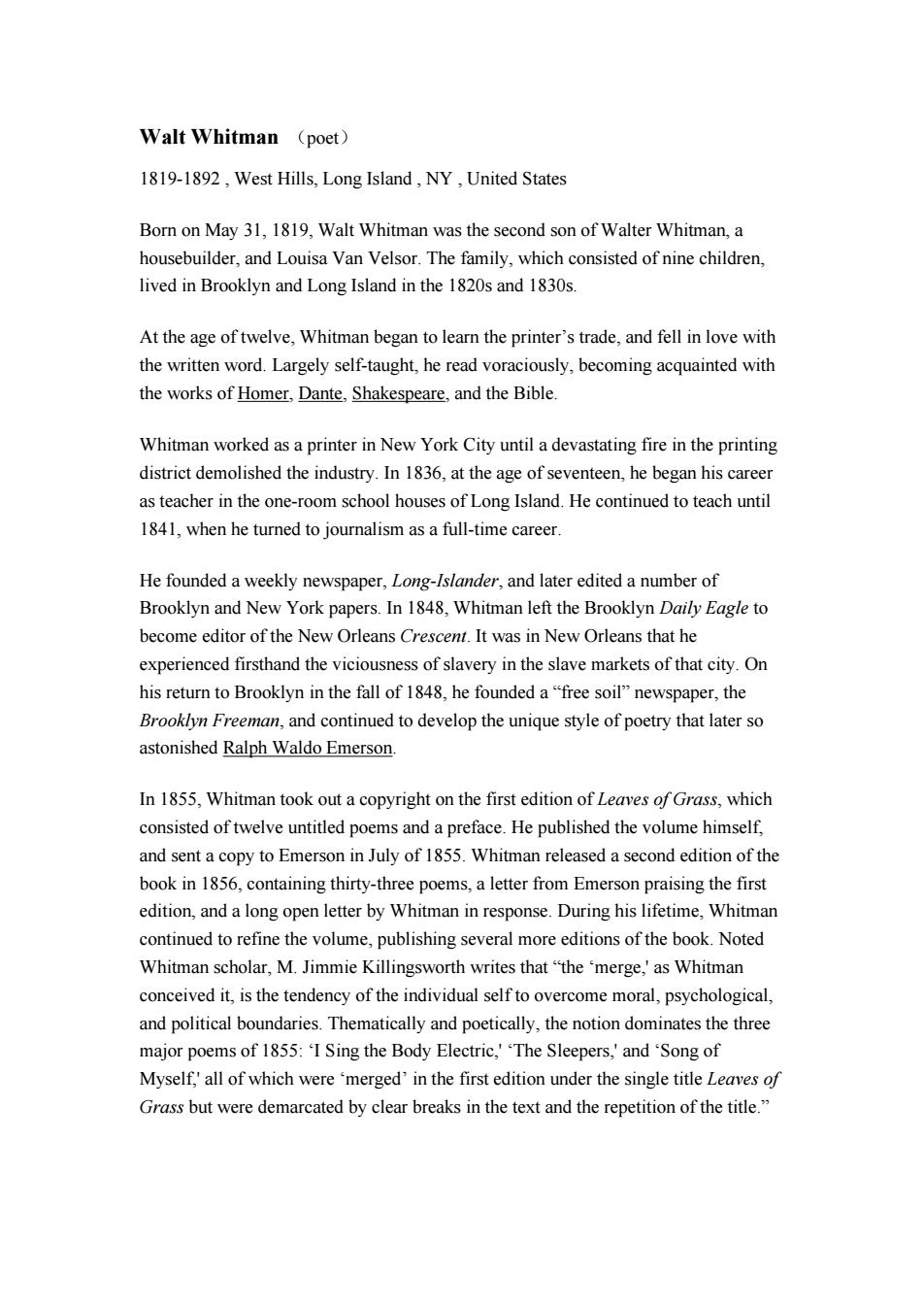正在加载图片...

Walt Whitman (poet) 1819-1892,West Hills,Long Island,NY,United States Born on May 31,1819,Walt Whitman was the second son of Walter Whitman,a housebuilder,and Louisa Van Velsor.The family,which consisted of nine children, lived in Brooklyn and Long Island in the 1820s and 1830s. At the age of twelve,Whitman began to learn the printer's trade,and fell in love with the written word.Largely self-taught,he read voraciously,becoming acquainted with the works of Homer,Dante,Shakespeare,and the Bible. Whitman worked as a printer in New York City until a devastating fire in the printing district demolished the industry.In 1836,at the age of seventeen,he began his career as teacher in the one-room school houses of Long Island.He continued to teach until 1841,when he turned to journalism as a full-time career. He founded a weekly newspaper,Long-Islander,and later edited a number of Brooklyn and New York papers.In 1848,Whitman left the Brooklyn Daily Eagle to become editor of the New Orleans Crescent.It was in New Orleans that he experienced firsthand the viciousness of slavery in the slave markets of that city.On his return to Brooklyn in the fall of 1848,he founded a"free soil"newspaper,the Brooklyn Freeman,and continued to develop the unique style of poetry that later so astonished Ralph Waldo Emerson. In 1855,Whitman took out a copyright on the first edition of Leaves of Grass,which consisted of twelve untitled poems and a preface.He published the volume himself, and sent a copy to Emerson in July of 1855.Whitman released a second edition of the book in 1856,containing thirty-three poems,a letter from Emerson praising the first edition,and a long open letter by Whitman in response.During his lifetime,Whitman continued to refine the volume,publishing several more editions of the book.Noted Whitman scholar,M.Jimmie Killingsworth writes that"the 'merge,'as Whitman conceived it,is the tendency of the individual self to overcome moral,psychological, and political boundaries.Thematically and poetically,the notion dominates the three major poems of 1855:'I Sing the Body Electric,The Sleepers,'and Song of Myself,'all of which were 'merged'in the first edition under the single title Leaves of Grass but were demarcated by clear breaks in the text and the repetition of the title."Walt Whitman (poet) 1819-1892 , West Hills, Long Island , NY , United States Born on May 31, 1819, Walt Whitman was the second son of Walter Whitman, a housebuilder, and Louisa Van Velsor. The family, which consisted of nine children, lived in Brooklyn and Long Island in the 1820s and 1830s. At the age of twelve, Whitman began to learn the printer’s trade, and fell in love with the written word. Largely self-taught, he read voraciously, becoming acquainted with the works of Homer, Dante, Shakespeare, and the Bible. Whitman worked as a printer in New York City until a devastating fire in the printing district demolished the industry. In 1836, at the age of seventeen, he began his career as teacher in the one-room school houses of Long Island. He continued to teach until 1841, when he turned to journalism as a full-time career. He founded a weekly newspaper, Long-Islander, and later edited a number of Brooklyn and New York papers. In 1848, Whitman left the Brooklyn Daily Eagle to become editor of the New Orleans Crescent. It was in New Orleans that he experienced firsthand the viciousness of slavery in the slave markets of that city. On his return to Brooklyn in the fall of 1848, he founded a “free soil” newspaper, the Brooklyn Freeman, and continued to develop the unique style of poetry that later so astonished Ralph Waldo Emerson. In 1855, Whitman took out a copyright on the first edition of Leaves of Grass, which consisted of twelve untitled poems and a preface. He published the volume himself, and sent a copy to Emerson in July of 1855. Whitman released a second edition of the book in 1856, containing thirty-three poems, a letter from Emerson praising the first edition, and a long open letter by Whitman in response. During his lifetime, Whitman continued to refine the volume, publishing several more editions of the book. Noted Whitman scholar, M. Jimmie Killingsworth writes that “the ‘merge,' as Whitman conceived it, is the tendency of the individual self to overcome moral, psychological, and political boundaries. Thematically and poetically, the notion dominates the three major poems of 1855: ‘I Sing the Body Electric,' ‘The Sleepers,' and ‘Song of Myself,' all of which were ‘merged’ in the first edition under the single title Leaves of Grass but were demarcated by clear breaks in the text and the repetition of the title